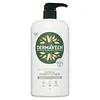What's inside
What's inside
 Key Ingredients
Key Ingredients

No key ingredients
 Benefits
Benefits

 Concerns
Concerns

 Ingredients Side-by-side
Ingredients Side-by-side

Water
Skin ConditioningCetearyl Alcohol
EmollientCyclotetrasiloxane
EmollientAvena Sativa Kernel Flour
AbrasiveDimethicone
EmollientCetrimonium Chloride
AntimicrobialHydroxyethylcellulose
Emulsion StabilisingPhenoxyethanol
PreservativeCaprylyl Glycol
EmollientBehentrimonium Methosulfate
Lauryl Pyrrolidone
CleansingAmodimethicone
Sodium PCA
HumectantPanthenol
Skin ConditioningCyclopentasiloxane
EmollientCocodimonium Hydroxypropyl Hydrolyzed Wheat Protein
CleansingAloe Barbadensis Leaf Juice
Skin ConditioningSorbic Acid
PreservativeTrideceth-12
EmulsifyingWater, Cetearyl Alcohol, Cyclotetrasiloxane, Avena Sativa Kernel Flour, Dimethicone, Cetrimonium Chloride, Hydroxyethylcellulose, Phenoxyethanol, Caprylyl Glycol, Behentrimonium Methosulfate, Lauryl Pyrrolidone, Amodimethicone, Sodium PCA, Panthenol, Cyclopentasiloxane, Cocodimonium Hydroxypropyl Hydrolyzed Wheat Protein, Aloe Barbadensis Leaf Juice, Sorbic Acid, Trideceth-12
Ingredients Explained
These ingredients are found in both products.
Ingredients higher up in an ingredient list are typically present in a larger amount.
Behentrimonium Methosulfate is an ammonium salt. It is mainly used to prevent static in haircare products as a surfactant.
Surfactants have differing ends: one side is hydrophilic while the other end is hydrophobic.
Surfactants also help your cleansers remove pollutants more easily from the skin.
Learn more about Behentrimonium MethosulfateCaprylyl Glycol is a humectant and emollient, meaning it attracts and preserves moisture.
It is a common ingredient in many products, especially those designed to hydrate skin. The primary benefits are retaining moisture, skin softening, and promoting a healthy skin barrier.
Though Caprylyl Glycol is an alcohol derived from fatty acids, it is not the kind that can dry out skin.
This ingredient is also used as a preservative to extend the life of products. It has slight antimicrobial properties.
Learn more about Caprylyl GlycolCetearyl alcohol is a mixture of two fatty alcohols: cetyl alcohol and stearyl alcohol. It is mainly used as an emulsifier. Emulsifiers help prevent the separation of oils and products. Due to its composition, it can also be used to thicken a product or help create foam.
Cetearyl alcohol is an emollient. Emollients help soothe and hydrate the skin by trapping moisture.
Studies show Cetearyl alcohol is non-toxic and non-irritating. The FDA allows products labeled "alcohol-free" to have fatty alcohols.
This ingredient is usually derived from plant oils such as palm, vegetable, or coconut oils. There is debate on whether this ingredient will cause acne.
Due to the fatty acid base, this ingredient may not be Malassezia folliculitis safe.
Learn more about Cetearyl AlcoholCyclopentasiloxane, or D5, is a silicone used to improve texture of products and trap moisture.
D5 is considered lightweight and volatile. Volatile means it evaporates quickly after application. Once evaporated, D5 leaves a thin barrier that helps keep skin hydrated.
It is also an emollient. Emollients help soften the skin and prevent water loss. Silicones create a silky texture in products. D5 helps other ingredients become more spreadable.
Studies show D5 is safe to use in skincare products. We recommend speaking with a skincare professional if you have concerns.
Learn more about CyclopentasiloxanePanthenol is a common ingredient that helps hydrate and soothe the skin. It is found naturally in our skin and hair.
There are two forms of panthenol: D and L.
D-panthenol is also known as dexpanthenol. Most cosmetics use dexpanthenol or a mixture of D and L-panthenol.
Panthenol is famous due to its ability to go deeper into the skin's layers. Using this ingredient has numerous pros (and no cons):
Like hyaluronic acid, panthenol is a humectant. Humectants are able to bind and hold large amounts of water to keep skin hydrated.
This ingredient works well for wound healing. It works by increasing tissue in the wound and helps close open wounds.
Once oxidized, panthenol converts to pantothenic acid. Panthothenic acid is found in all living cells.
This ingredient is also referred to as pro-vitamin B5.
Learn more about PanthenolWater. It's the most common cosmetic ingredient of all. You'll usually see it at the top of ingredient lists, meaning that it makes up the largest part of the product.
So why is it so popular? Water most often acts as a solvent - this means that it helps dissolve other ingredients into the formulation.
You'll also recognize water as that liquid we all need to stay alive. If you see this, drink a glass of water. Stay hydrated!
Learn more about Water